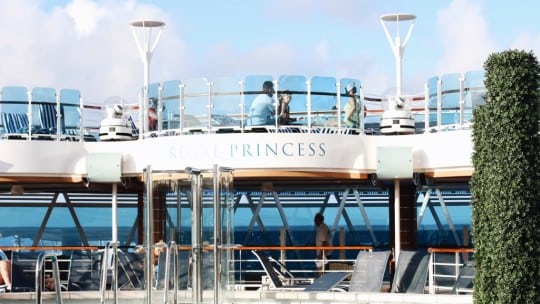

The coronavirus pandemic is a perfect example of why increasing awareness is a terrible PR objective. I’ve been aware of cruise ships since I was a child. My father decided to celebrate retirement by taking me, his only offspring, around the world. The first leg of the journey was aboard the QE2, from New York to LeHavre. I was 16 and found the cruise dull, but was fascinated by the extent to which my father was the center of attention for so many attractive, elderly (in my eyes) ladies.
But when news and photos began to appear about COVID-19 infections on board several vessels, my awareness quickly turned to horror. The thought of thousands of people stuck at sea on ships in which a highly contagious and frequently deadly disease ran rampant made my skin crawl.
My thoughts also turned to friends in places like Sitka, Alaska, and Fort Lauderdale, and all the other ports of call who would be unwitting recipients of the disease, courtesy of ships that were even then continuing to sail. The more aware I was of what was happening in the industry, the more certain I was that I would never again set foot on a cruise ship.
Awareness Turns to Outrage
Like most, I am aware of the importance and necessity of long-term care facilities. I have family members in them. But once again, that awareness turned to outrage and fear when news broke that most of the deaths in many states, including my own, were happening in those same places.
The reality is that COVID-19 has raised the visibility of many industries that we probably didn’t give much thought to before: meatpacking, supply-chain, food pantries, prisons, janitorial services. The list goes on. What happens to those industries now that they’ve had their visibility raised to levels previously reserved for sports teams and presidential candidates?
Some may return to relative obscurity when we finally realize we have enough toilet paper, thermometers and flour. Others will see their reputations and recognition enhanced by their philanthropic efforts – Steak-Umms and Dean Kamen come to mind – the latter a name some may remember as the inventor of the Segway, but who has more recently been credited with orchestrating delivery of badly needed PPE, among other important contributions. Others may go down in history as bad actors whose words and deeds helped prolong the COVID-19 nightmare.
Below we will examine how two of those now highly visible industries are responding: cruise lines and nursing homes.
The Cruise Line Industry
Back in March, when news of infected cruise ships began to surface, the volume of cases, and even deaths, seemed staggering. Since then, those numbers pale next to death tolls and infection rates elsewhere in the US.
The Miami Herald has been tracking the numbers. To date, there have been 2,787 cases and 74 deaths associated with cruise ships.
What truly tarred the industry was its insistence that ships were safe and its persistence in continuing to launch cruises and visit ports even after the initial cases and death were reported in early February.
The CDC issued warnings against boarding cruise ships on March 8, yet cruises continued to launch through mid-March. As of April 7, there were 6,000 passengers at sea. In late, Carnival Cruise Linesaid it had 10,000 healthy crew members aboard 18 of its ships.
The industry’s lobbying group, Cruise Lines International Association, issued a statement saying, “Upon declaration by the WHO of a pandemic, (March 11, 2020) CLIA-member cruise lines voluntarily suspended operations worldwide – making the cruise industry one of the first to do so.”
Daily headlines refuted this, of course. In addition, it didn’t help the industry’s credibility that President Trump weighed in on its behalf. Carnival Corp. chairman Micky Arison is a close friend of the president’s and a former sponsor of “The Apprentice.”
The industry also didn’t win friends when it lobbied for CARES act relief funds, despite avoiding paying US taxes, as most of its vessels are registered overseas.
Yet Carnival unveiled plans on May 4 to resume cruising from US ports, on a limited basis, by August 1. The resumption is subject to CDC approval and likely will include daily temperature checks, distancing and containment procedures. Still, Carnival says people are booking.

Nursing Homes
Relative to the cruise line industry, COVID-19 has dealt a far bigger blow to nursing homes. All over the US, once the media or health care officials started tracking data by source, the numbers of cases and deaths from nursing homes skyrocketed to more than 11,000, according to the AP. Sadly, there has been such limited testing in these facilities that there is widespread acknowledgement that those numbers are underreporting cases and fatalities.
Unfortunately, the industry’s message focuses more on being granted immunity from liability and lawsuits than concern for the sick and families of those who have died.
The American Health Care Association, which represents more than 14,000 for-profit nursing homes, issued a statement that said: “Long-term care workers and centers are on the frontline of this pandemic response and it is critical that states provide the necessary liability protection staff and providers need to provide care during this difficult time without fear of reprisal.”
There’s no sign of empathy in those 39 words.
Media reports as of press time say at least 11 states issued executive orders shielding health care providers from some form of liability during COVID-19. In addition, states like Kentucky, New York and Wisconsin have passed legislation to protect health care providers from liability during the global pandemic.
Advocates for occupants in these facilitates argue that granting immunity without requiring reporting and adherence to certain standards is an even bigger disaster waiting to happen. In many cases, family members, advocates and inspectors have been barred from entering the facilities.
“The rule waivers, diminished inspections, reduced oversight, and chronic understaffing in long-term care facilities may be a toxic combination,” says Toby Edelman, senior policy attorney at the Center for Medicare Advocacy. “There’s a lot of neglect in nursing homes in the best of times,” she adds, “and these are not the best of times.”
It’s an image disaster in the making.

CONTACT: [email protected]
